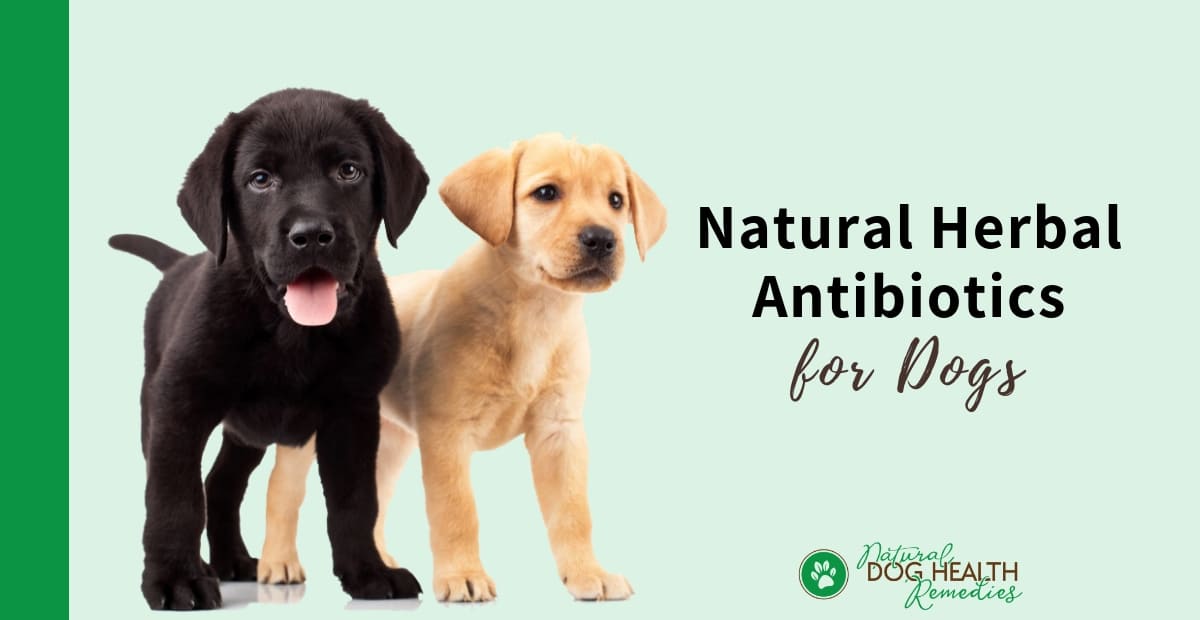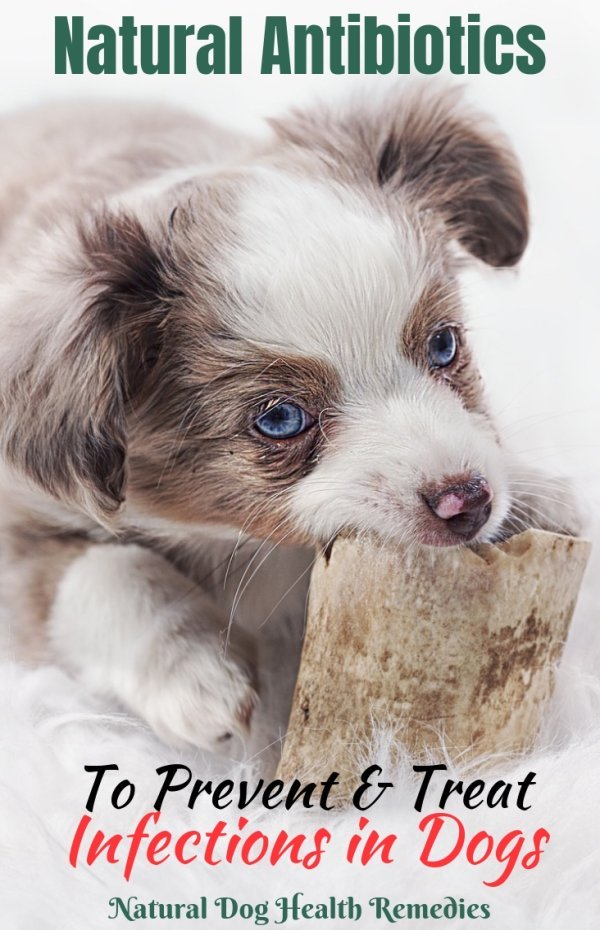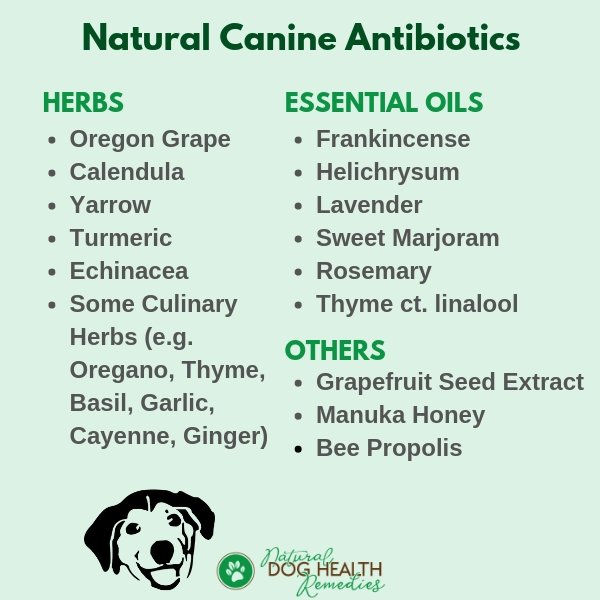Natural Canine Antibiotics
(FTC Disclosure: If you make a purchase via a link on this page, I may receive a small commission, at no added cost to you.)

Overview
In recent veterinary practice, synthetic canine antibiotics are one group of drugs that are being overly prescribed by vets. They are being used for even the slightest infections, and sometimes, ridiculously, for viral infections as well.
As a result, a lot of bacteria are now resistant to the conventional antibiotics; and many dogs are suffering from the side effects of the long-term drug use.
If you are looking for a safer alternative to conventional canine antibiotics, please read on. This page covers the following topics:
- Bacteria and conventional canine antibiotics
- Possible side effects of antibiotics
- Herbal antibiotics for dogs
- Essential oils as natural antibiotics for dogs
- Other natural antibiotics for dogs
Bacteria and Conventional Canine Antibiotics
Bacteria - The Good and the Bad
Not all bacteria are harmful.
When we mention bacteria, most people will automatically think about the "bad" (pathogenic) bacteria that are capable of causing infections or illnesses.
But within our dogs' bodies (and ours too), there are also good, "friendly" bacteria that are beneficial to our dogs (and us).
One such type of bacteria is the "gut bacteria", which live in the gastrointestinal tract of the host and which actually help with the digestion process. Some other good bacteria synthesize vitamin K (which is necessary for blood clotting). These "friendly" bacteria are commonly known as "normal flora".
When a dog is healthy, the "good" bacteria are able to keep the "bad" bacteria in check. But when the dog's immune system is compromised, the number of bad bacteria will overwhelm the good ones, and problems (e.g. infections) occur.
When a dog develops a bacterial infection, the "go-to" conventional drug is an antibiotic.
Conventional Canine Antibiotics
There are two types of antibiotics: bacteriostatic drugs are antibiotics that inhibit the growth of bacteria, and bactericidal drugs are those that kill bacteria.
The problem is, antibiotics are non-discriminatory when it comes to eliminating bacteria. The growth of both bad and good bacteria are inhibited or they are both killed outright.
So, long-term use or over-use of antibiotics can greatly weaken a dog's immune system, making the dog more prone to health issues, ranging from GI problems to yeast infections.
More seriously, over-use of antibiotics have led to the rapid development of "super bugs" - bacteria that have developed resistance to the existing drugs on the market.
Scientists have already acknowledged that our present technology cannot keep up with the bacteria's ability to mutate and develop resistance. What this means is that the more antibiotics we use today on our dogs, the more difficult it may be for vets to treat our dogs' future infectious diseases with any antibiotic.
Canine antibiotics should therefore be prescribed only when strictly necessary. They should only be used to treat infections and illnesses that have already set in, or have already progressed speedily.
Antibiotics should not be given to dogs as preventative medicines, unless it is absolutely necessary to do so.
Generally speaking, canine antibiotics should be given as a short course (e.g. 7-14 days) for a serious condition, such as a paralyzing attack of Lyme disease, or a serious dental abscess, or a life-threatening bladder infection.
Antibiotics lose their benefits when used long-term for chronic or recurring infections. Always ask the vet if it is absolutely necessary to give your dog an antibiotic, and refuse the drug if the vet prescribes it "just in case" and without a proper diagnosis.
Possible Side Effects of Antibiotics
The most common side effect caused by canine antibiotics is allergic reactions to the drugs. In fact, antibiotics cause more allergic reactions in dogs than any other group of drugs.
Signs of a mild allergic reaction include:
- Hives and skin rashes
- Itchy skin
- Watery eye discharge
A more serious but rare allergic drug reaction is anaphylactic shock, with signs such as:
- Vomiting and diarrhea
- Weakness
- Difficulty breathing
- Collapse
Also, as mentioned above, because antibiotics cause an upset in the balance of gut flora, antibiotic treatment is often followed by bouts of indigestion, yeast infections, and ear infections.
Natural Canine Antibiotics Made from Herbs
 While conventional canine antibiotics are necessary for infections that have already set in or are progressing rapidly, natural antibiotics are good to use in the beginning phases of an infection.
While conventional canine antibiotics are necessary for infections that have already set in or are progressing rapidly, natural antibiotics are good to use in the beginning phases of an infection.
There are actually a variety of herbs that have strong anti-bacterial properties (either inhibiting bacterial growth or killing the bacteria) and can be used to treat illnesses caused by bad bacteria.
Here are some common herbs that can be used as natural antibiotics for dogs:
- Oregon Grape Root (Mahonia aquifolium): The herb Oregon Grape root contains berberine, which is effective against bacteria, fungi, yeasts, and protozoans. As such, Oregon grape has strong antibiotic effects.
If you are using Oregon grape for an extended period of time (e.g. over 2 weeks) on your dog, it is advisable to add probiotic supplements to the dog's diet to ensure that the normal gut flora is balanced.
- Calendula (Calendula officinalis): Calendula has been found to have anti-bacterial, anti-viral, and anti-fungal properties. Topically, it is very effective in disinfecting and healing wounds. It acts as a general tonic and stimulates the liver and immune system stimulant when taken internally as a tea or tincture.
- Yarrow (Achillea millefolium): Yarrow has anti-bacterial, anti-inflammatory, and antiseptic properties.
Used externally, it is a good healer of wounds of all sorts. It stops bleeding and infections.
Taken internally, it supports the liver, soothes upset stomachs, and helps poor digestion. It is widely used to treat fevers, colds, and flu-like symptoms.
- Turmeric (Curcuma longa): This potent herb is anti-bacterial, anti-inflammatory and a powerful antioxidant.
Topically, you can use it (mixed with manuka honey - another natural antibiotic) to stop skin infections.
Taken internally, it stimulates the liver and is good for GI problems such as irritable bowel syndrome.
- Echinacea (Echinacea spp.): Echinacea is known for its ability to balance the immune system and, due to its powerful anti-bacterial and anti-inflammatory properties, is effective against all types of infections.
- Some culinary herbs: You can also easily use some herbs from your kitchen as canine antibiotics. Herbs such as thyme, basil, cayenne, ginger, and garlic all have anti-bacterial properties.
Essential Oils as Natural Antibiotics for Dogs
Quite a few essential oils have antibacterial properties and can be used topically to disinfect minor wounds. (DO NOT give essential oils to dogs internally without supervision of a vet with proper training in aromatherapy.)
Some antibacterial essential oils that are safe to use topically on dogs include:
- Frankincense (Boswellia carterii)
- Helichrysum (Helichrysum italicum)
- Lavender (Lavandula angustifolia)
- Sweet Marjoram (Origanum majorana)
- Rosemary (Rosmarinus officinalis) (do not use on epileptic dogs)
- Thyme ct. linalool (Thymus vulgaris ct. linalol)
Other Natural Canine Antibiotics
In addition to herbal canine antibiotics, there are other natural and readily available substances that can be used as antibiotics for dogs. For example:
- Grapefruit Seed Extract: Visit this page for more information on how to use GSE as a natural antibiotic.
- Herbal Manuka Honey: Click here to see how to make herbal honey.
- Bee Propolis: Bee Propolis is an excellent natural antibiotic and topical disinfectant. Liquid propolis can be applied to burns, minor wounds such as cuts and scratches. It can also be mixed with aloe vera gel if the affected areas are large.
 References
References
C.J. Puotinen, Natural Remedies for Dogs and Cats (Keats Publishing, 1999).
M.L. Wulff-Tilford and G.L. Tilford, Herbs for Pets (Bowtie Press, 1999).
M. Goldstein, The Nature of Animal Healing (Ballantine Books, 2000).





